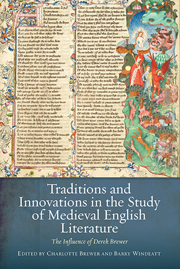 Traditions and Innovations in the Study of Medieval English Literature
Traditions and Innovations in the Study of Medieval English Literature Book contents
- Frontmatter
- Contents
- List of Contributors
- Acknowledgements
- Note on References
- Introduction: A Modern Medievalist's Career
- 1 Derek Brewer: Chaucerian Studies 1953–78
- 2 Brewer's Chaucer and the Knightly Virtues
- 3 Class Distinction and the French of England
- 4 Time in Troilus and Criseyde
- 5 Virtue, Intention and the Mind's Eye in Troilus and Criseyde
- 6 Falling in Love in the Middle Ages
- 7 The Idea of Feminine Beauty in Troilus and Criseyde, or Criseyde's Eyebrow
- 8 ‘Greater Love Hath No Man’: Friendship in Medieval English Romance
- 9 Gowerian Laughter
- 10 Derek Brewer's Romance
- 11 Malory and Late Medieval Arthurian Cycles
- 12 The Ends of Storytelling
- 13 Manuscripts, Facsimiles, Approaches to Editing
- 14 Words and Dictionaries: OED, MED and Chaucer
- 15 Afterlives: The Fabulous History of Venus
- Afterword: Derek Brewer: with ful deuout corage
- Bibliography
- Index
- Tabula in Memoriam
8 - ‘Greater Love Hath No Man’: Friendship in Medieval English Romance
Published online by Cambridge University Press: 05 September 2013
- Frontmatter
- Contents
- List of Contributors
- Acknowledgements
- Note on References
- Introduction: A Modern Medievalist's Career
- 1 Derek Brewer: Chaucerian Studies 1953–78
- 2 Brewer's Chaucer and the Knightly Virtues
- 3 Class Distinction and the French of England
- 4 Time in Troilus and Criseyde
- 5 Virtue, Intention and the Mind's Eye in Troilus and Criseyde
- 6 Falling in Love in the Middle Ages
- 7 The Idea of Feminine Beauty in Troilus and Criseyde, or Criseyde's Eyebrow
- 8 ‘Greater Love Hath No Man’: Friendship in Medieval English Romance
- 9 Gowerian Laughter
- 10 Derek Brewer's Romance
- 11 Malory and Late Medieval Arthurian Cycles
- 12 The Ends of Storytelling
- 13 Manuscripts, Facsimiles, Approaches to Editing
- 14 Words and Dictionaries: OED, MED and Chaucer
- 15 Afterlives: The Fabulous History of Venus
- Afterword: Derek Brewer: with ful deuout corage
- Bibliography
- Index
- Tabula in Memoriam
Summary
Friendship was a subject of special resonance for Derek Brewer because of its close relation in medieval writing to the themes of loyalty, courage and honour that were dear to his heart and expressed in his own, deeply chivalrous, mode of being in the world. For rather different reasons, the topic of friendship has attracted the attention of scholars working on the medieval and early modern periods in the last several decades. Cultural and literary explorations of friendship, and particularly same-sex friendship, provide alternative perspectives on the subject of love, suggest hidden and forbidden desires and illuminate political, social, moral and spiritual bonds, both public and private. Brewer both called attention to, and questioned, the way that ‘modern scholarship and cultural history have recently seized upon [friendship]’ and, in particular, the assumption that the history of friendship intersected with the history of homosexual love (2005a: 155). Brewer's ‘Some Notes on “Ennobling Love” and its Successor in Medieval Romance’ (2005b) engaged with, and offered a corrective to, C. Stephen Jaeger's argument (1999) that classical and early medieval conventions of passionate male friendship, public and socially constructed, shaped later medieval concepts of heterosexual ‘courtly love’. In response, Brewer drew attention to the long history of heterosexual love.
- Type
- Chapter
- Information
- Traditions and Innovations in the Study of Medieval English LiteratureThe Influence of Derek Brewer, pp. 128 - 143Publisher: Boydell & BrewerPrint publication year: 2013


